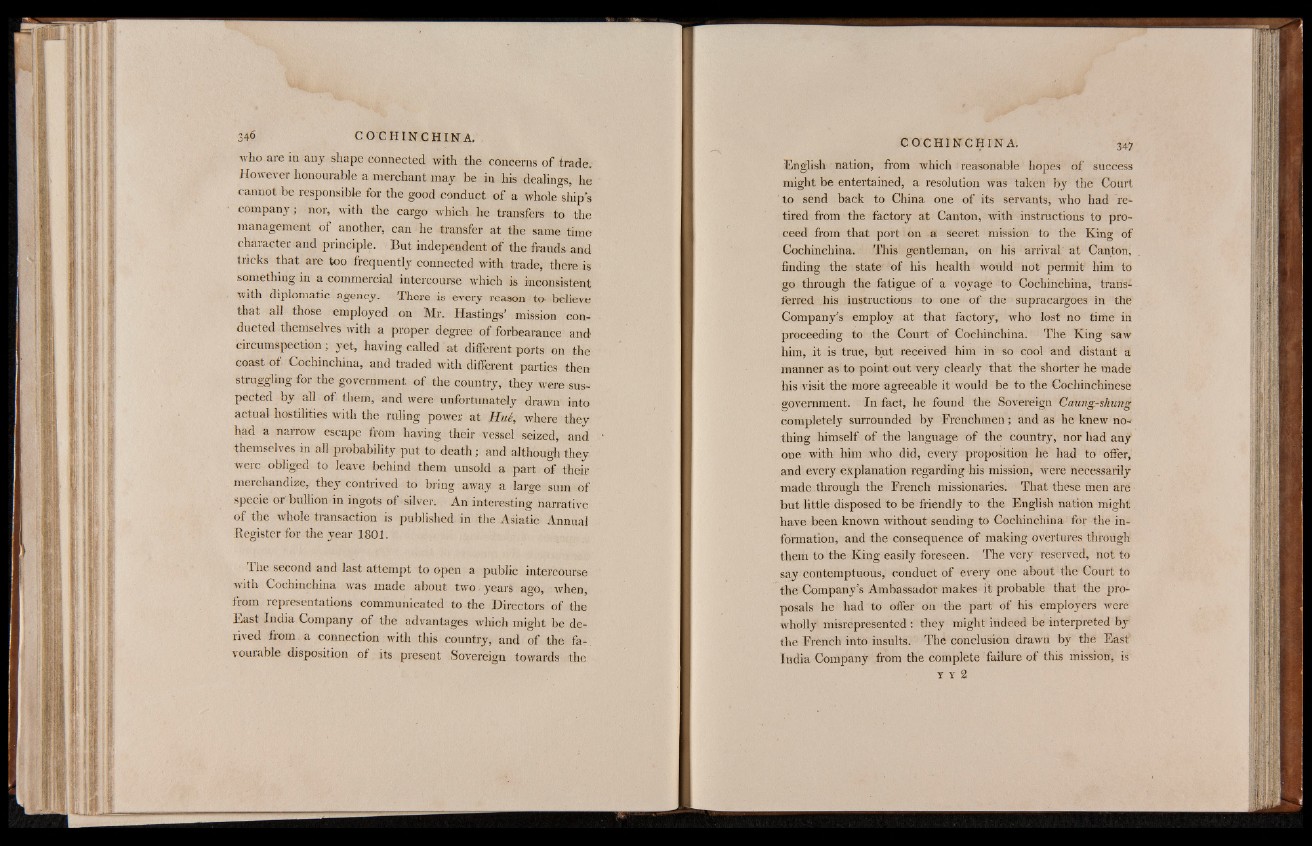
who are in any shape connected with the concerns of trade.
However honourable a merchant may be in his dealings, he
cannot be responsible for the good conduct of a whole ship’s
company ; nor, with the cargo which he transfers to the
management of another, can he transfer at the same time
character and principle. But independent of the frauds and
tricks that are too frequently connected with trade, there is
something in a commercial intercourse which is inconsistent
with diplomatic agency. There is every reason to believe
that all those employed on Mr. Hastings’ mission conducted
themselves with a proper degree of forbearance and1
circumspection ; yet, having called at different ports on the
coast of Cochinchina, and traded with different parties then
struggling for the government of the country, they were suspected
by all of them, and were unfortunately drawn into
actual hostilities with the ruling power at Hué, where they
had a narrow escape from having their vessel seized, and
themselves in all probability put to death ; and although they
Were obliged to leave behind them unsold a part of their
merchandize, they contrived to bring away a large sum of
specie o t bullion in ingots of silver. An interesting narrative
of the whole transaction is published in the Asiatic Annual
Register for the year 1801.
The second and last attempt to open a public intercourse
with, Cochinchina was made about two . years ago, when,
from representations communicated to the Directors of the
East India Company of the advantages which might be derived
from a connection with this country, and of the fa-
vouiable disposition of its present Sovereign towards the
English nation, from which reasonable hopes of success
might be entertained, a resolution was taken by the Court
to send back to China one of its servants, who had retired
from the factory at Canton, with instructions to proceed
from that port on a secret mission to the King of
Cochinchina. This gentleman, on his arrival at Canton,
finding the state of his health would not permit him to
go through the fatigue of a voyage to Cochinchina, transferred
his instructions to one of the supracargoes in the
Company’s employ at. that factory, who lost no time in
proceeding to the Court of Cochinchina. The King saw
him, it is true, but received him in so cool and distant a
manner as to point out very clearly that the shorter he made
his visit the more agreeable it would be to the Cochinchinese
government. In fact, he found the Sovereign Caunsrshuns
completely surrounded by Frenchmen; and as he knew nothing
himself of the language of the country, nor had any
one with him who did, every proposition he had to offer,
and every explanation regarding his mission, were necessarily
made through the French missionaries. That these men are
but little disposed to be friendly to the English nation might
have been known without sending to Cochinchina for the information,
and the consequence of making overtures through
them to the King easily foreseen. The very reserved, not to
say contemptuous, conduct of every one about the Court to
the Company’s Ambassador makes it probable that the proposals
he had to offer on the part of his employers were
wholly misrepresented : they might indeed be interpreted by
the French into insults. The conclusion drawn by the East.
India Company from the complete failure of this mission, is
y y 2